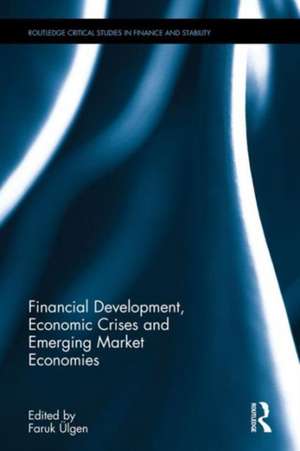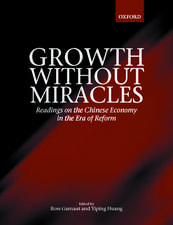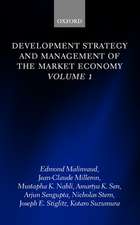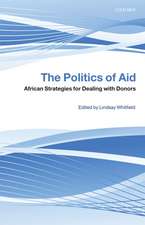Financial Development, Economic Crises and Emerging Market Economies: Routledge Critical Studies in Finance and Stability
Editat de Faruk Ulgenen Limba Engleză Hardback – 15 aug 2016
But even after the 2007-2008 global crisis, economists do not agree on the meaning of those conditions. For liberal and equilibrium-market economists, good finance and supervision mean market-friendly structures while for institutionalists, post-Keynesian and Marxist economists, good finance and supervision must lie in collectively designed and managed public structures. Drawing heavily on the tumultuous crises of the 1990s-2000s, this book argues that those experiences can shed light on such a crucial issue and lead economic theory and policy to go beyond the blindness of efficient free markets doctrine to economic catastrophes. It also points to new challenges to global stability in the wake of reconfiguration of international financial arena under the weight of major emerging market economies.
Din seria Routledge Critical Studies in Finance and Stability
-
 Preț: 288.26 lei
Preț: 288.26 lei -
 Preț: 292.82 lei
Preț: 292.82 lei - 28%
 Preț: 852.88 lei
Preț: 852.88 lei -
 Preț: 489.26 lei
Preț: 489.26 lei -
 Preț: 349.38 lei
Preț: 349.38 lei -
 Preț: 349.53 lei
Preț: 349.53 lei - 17%
 Preț: 172.64 lei
Preț: 172.64 lei - 12%
 Preț: 312.43 lei
Preț: 312.43 lei - 12%
 Preț: 299.52 lei
Preț: 299.52 lei - 17%
 Preț: 172.64 lei
Preț: 172.64 lei -
 Preț: 389.66 lei
Preț: 389.66 lei - 17%
 Preț: 271.20 lei
Preț: 271.20 lei -
 Preț: 413.33 lei
Preț: 413.33 lei - 16%
 Preț: 264.59 lei
Preț: 264.59 lei -
 Preț: 382.32 lei
Preț: 382.32 lei - 16%
 Preț: 274.06 lei
Preț: 274.06 lei - 22%
 Preț: 324.29 lei
Preț: 324.29 lei -
 Preț: 389.38 lei
Preț: 389.38 lei - 15%
 Preț: 322.60 lei
Preț: 322.60 lei - 14%
 Preț: 325.70 lei
Preț: 325.70 lei - 16%
 Preț: 225.30 lei
Preț: 225.30 lei - 18%
 Preț: 1005.39 lei
Preț: 1005.39 lei
Preț: 1001.84 lei
Preț vechi: 1221.75 lei
-18% Nou
Puncte Express: 1503
Preț estimativ în valută:
191.70€ • 199.76$ • 158.73£
191.70€ • 199.76$ • 158.73£
Carte tipărită la comandă
Livrare economică 03-17 aprilie
Preluare comenzi: 021 569.72.76
Specificații
ISBN-13: 9781138123755
ISBN-10: 1138123757
Pagini: 258
Ilustrații: 54
Dimensiuni: 156 x 234 x 20 mm
Greutate: 0.5 kg
Ediția:1
Editura: Taylor & Francis
Colecția Routledge
Seria Routledge Critical Studies in Finance and Stability
Locul publicării:Oxford, United Kingdom
ISBN-10: 1138123757
Pagini: 258
Ilustrații: 54
Dimensiuni: 156 x 234 x 20 mm
Greutate: 0.5 kg
Ediția:1
Editura: Taylor & Francis
Colecția Routledge
Seria Routledge Critical Studies in Finance and Stability
Locul publicării:Oxford, United Kingdom
Public țintă
Postgraduate and UndergraduateCuprins
Preface
James K. Galbraith
Introduction: Financial Development: The Sword Of Damocles Hanging Over The Process Of Economic Development
Faruk Ülgen
Chapter 1. Financial Liberalization, Crises And Policy Implications
Philip Arestis
Chapter 2. Global Financing: A Bad Medicine For Developing Countries
Joaquín Arriola
Chapter 3. Financial Development, Instability And Some Confused Equations
Faruk Ülgen
Chapter 4. Underdeveloped Financial Markets Infrastructure Of Emerging Market Economies. Assessment Of Underlying Challenges And Suggested Policy Responses
Shazia GHANI
Chapter 5. Towards De-Financialization
Malcolm Sawyer
Chapter 6. A Common Currency For The Common Good
Sergio Rossi
Chapter 7. A Capital Market Without Banks. Lending And Borrowing In Hennaarderadeel, Friesland, 1537–1555
Merijn KNIBBE And Paul Borghaerts
Chapter 8. Financial Liberalization, Financial Development And Instability In Emerging Economies: What Lessons For The Franc Zone?
Aboubakar Sidiki Cisse
Chapter 9. Depositor Myopia And Banking Sector Behavior
Ozan Bakis, Fatih Karanfil And Sezgin Polat
Chapter 10. Dollarization And Financial Development: The Experience Of LA Countries
Eugenia Correa And Alicia Girón
Chapter 11. Financialization In Brazil: A Paper Tiger, With Atomic Teeth?
Pierre Salama
Chapter 12. National And Supra-National Financial Regulatory Architecture: Transformations Of The Russian Financial System In The Post-Soviet Period
Nadezhda N. Pokrovskaia
Chapter 13: Minsky In Beijing: Shadow Banking, Credit Expansion And Debt Accumulation In China
Yan Liang
James K. Galbraith
Introduction: Financial Development: The Sword Of Damocles Hanging Over The Process Of Economic Development
Faruk Ülgen
Chapter 1. Financial Liberalization, Crises And Policy Implications
Philip Arestis
Chapter 2. Global Financing: A Bad Medicine For Developing Countries
Joaquín Arriola
Chapter 3. Financial Development, Instability And Some Confused Equations
Faruk Ülgen
Chapter 4. Underdeveloped Financial Markets Infrastructure Of Emerging Market Economies. Assessment Of Underlying Challenges And Suggested Policy Responses
Shazia GHANI
Chapter 5. Towards De-Financialization
Malcolm Sawyer
Chapter 6. A Common Currency For The Common Good
Sergio Rossi
Chapter 7. A Capital Market Without Banks. Lending And Borrowing In Hennaarderadeel, Friesland, 1537–1555
Merijn KNIBBE And Paul Borghaerts
Chapter 8. Financial Liberalization, Financial Development And Instability In Emerging Economies: What Lessons For The Franc Zone?
Aboubakar Sidiki Cisse
Chapter 9. Depositor Myopia And Banking Sector Behavior
Ozan Bakis, Fatih Karanfil And Sezgin Polat
Chapter 10. Dollarization And Financial Development: The Experience Of LA Countries
Eugenia Correa And Alicia Girón
Chapter 11. Financialization In Brazil: A Paper Tiger, With Atomic Teeth?
Pierre Salama
Chapter 12. National And Supra-National Financial Regulatory Architecture: Transformations Of The Russian Financial System In The Post-Soviet Period
Nadezhda N. Pokrovskaia
Chapter 13: Minsky In Beijing: Shadow Banking, Credit Expansion And Debt Accumulation In China
Yan Liang
Notă biografică
Faruk Ülgen is Associate Professor, Grenoble Faculty of Economics, Director of the Department of International Relations and Conventions, and Head of the Department of Economics of the Branch Campus of Valence of the University Grenoble Alpes, France.
Descriere
Recurrent crisis in emerging markets and advanced economies in the last few decades have cast doubt on the ability of financial liberalization to meet the aims of sustainable economic growth and development. The increasing importance of financial markets and financial efficiency principles over economic decisions and policies since the 1980s laid down the conditions of the development process of emerging market economies.
Drawing heavily on the tumultuous crises of the 1990s-2000s, Financial Development, Economic Crises and Emerging Market Economies argues that those experiences can shed light on such a crucial issue and lead economic theory and policy to go beyond the blindness of efficient free market doctrine to economic catastrophes. This book focuses on the weaknesses and irrelevance of financialized economic structures and refers to the implications of the ongoing global crisis with regard to the financial basics of a sustainable growth and global stability.
Different critical perspectives and case studies presented in this book develop arguments against financialization and market fundamentalism, which are regarded as the main pitfalls in the process of growth and development. Chapters give sound support for alternative economic and financial policies that would be able to lead banking and financial systems to accompany collectively manageable economic development. This book is of great interest to those who study political economy, development economics and monetary economics.
Drawing heavily on the tumultuous crises of the 1990s-2000s, Financial Development, Economic Crises and Emerging Market Economies argues that those experiences can shed light on such a crucial issue and lead economic theory and policy to go beyond the blindness of efficient free market doctrine to economic catastrophes. This book focuses on the weaknesses and irrelevance of financialized economic structures and refers to the implications of the ongoing global crisis with regard to the financial basics of a sustainable growth and global stability.
Different critical perspectives and case studies presented in this book develop arguments against financialization and market fundamentalism, which are regarded as the main pitfalls in the process of growth and development. Chapters give sound support for alternative economic and financial policies that would be able to lead banking and financial systems to accompany collectively manageable economic development. This book is of great interest to those who study political economy, development economics and monetary economics.












